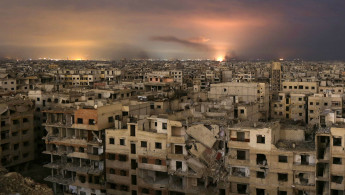'Children are living in hell': Aid group slams Russia truce in Eastern Ghouta as 'inadequate'
"The five-hour daily truce and the imposition of a so-called humanitarian corridor proposed by the Russian President is not good enough," said Sonia Khush, Save the Children's Syria Response Director.
"The UN Security Council had already unanimously agreed to stronger actions over the weekend, including the cessation of hostilities for at least 30 days and the immediate delivery of humanitarian aid as well as medical evacuations.
"Children and their families are living in hell as they desperately try to protect themselves from this horrifying and never-ending violence."
New video footage verified and released by Save the Children shows the dramatic aftermath of the shelling of a Syrian aid group’s office hours before the UN Security Council voted on a 30-day ceasefire on Saturday.
The video conveys the terrifying chaos in the basement of the office, where 46 families have been sheltering. People scramble to respond as children scream and the dust slowly clears. Three people were injured in the attack, including two young girls.
 |
As this conflict enters its eighth year, it’s clear that it is far from being resolved, and all parties involved continue to show utter contempt for children’s lives and wellbeing |  |
No end to bombs
Despite the Security Council adopting the resolution over the weekend, partners of Save the Children say the bombing has continued since dawn on Tuesday with many killed, including a family of 10, as thousands of families remain cowered in basements.
Furthermore, people are unable to bury their loved ones due to the ongoing shelling.
As families continue to shelter in the basement, the nearly five year-long siege has tightened in recent months, and supplies are running dangerously low.
Local aid workers say 4,100 families are now living in a network of underground basements and shelters – more than half without water, sanitation or ventilation systems, making children vulnerable to the spread of disease. More than 350,000 civilians remain trapped in Eastern Ghouta.
Meanwhile, women are giving birth under horrendous circumstances. Photos have emerged of one girl, Amal* who was born in a dark and overcrowded underground shelter, as well as a little boy, Tamer*.
On Thursday, a young boy Ahmed* had been trapped in a makeshift shelter for four days amid intense bombing.
“We’ve not been able to go to school, they shelled the school, the teacher was killed,” he said.
“There is no food and we can’t go outside, the shops are closed, the planes are bombing.”
His older sister Mona was recently injured in fighting.
"I got injured and I stayed one month in the hospital and could not leave. There is no food or water. I still don’t feel well, my bones feel weak.”
 |
Families are now living in a network of underground basements and shelters – more than half without water, sanitation or ventilation systems... women are giving birth under horrendous circumstances |  |
Recent satellite images of one neighbourhood in Eastern Ghouta show up to 71 percent of buildings destroyed or damaged.
"As this conflict enters its eighth year, it’s clear that it is far from being resolved, and all parties involved continue to show utter contempt for children’s lives and wellbeing. The fighting must cease and aid agencies must be allowed to deliver lifesaving humanitarian assistance or more children will die," said Khush.
The Syrian conflict began when the Baath regime, in power since 1963 and led by President Bashar al-Assad, responded with military force to peaceful protests demanding democratic reforms during the Arab Spring wave of uprisings, triggering an armed rebellion fuelled by mass defections from the Syrian army.
According to independent monitors, hundreds of thousands of civilians have been killed in the war, mostly by the regime and its powerful allies, and millions have been displaced both inside and outside of Syria. The brutal tactics pursued mainly by the regime, which have included the use of chemical weapons, sieges, mass executions and torture against civilians have led to war crimes investigations.





 Follow the Middle East's top stories in English at The New Arab on Google News
Follow the Middle East's top stories in English at The New Arab on Google News


![22 Arab countries at COP29 have rejected the targeting of fossil fuels [Getty]](/sites/default/files/styles/image_330x185/public/2024-11/GettyImages-2184289638.jpg?h=199d8c1f&itok=ptHl5bec)